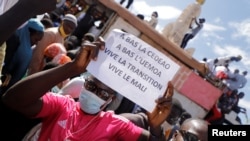Mali's military junta will take 24 months from March 2022 to restore civilian rule after an August 2020 coup, its spokesman said on Monday, the latest move in negotiations with regional bloc ECOWAS to lift sanctions crippling the economy
The West African country's military leaders have been under pressure to restore democracy since they toppled the government and failed on a promise to hold elections in February, prompting sanctions from the Economic Community of West African States (ECOWAS).
"The duration of the transition is set at 24 months," the transitional government spokesman Abdoulaye Maiga said on national television, with a start date of March 26, 2022.
Maiga said the decree followed an "advanced stage of negotiations with ECOWAS" and Mali hoped sanctions would be lifted.
"The adoption of this decree is proof of the willingness of (Malian) authorities to dialogue with ECOWAS," he added.
Mali's putsch leaders and regional heads of state have been at odds over a proposed five-year election timeline that was then revised to two - a delay that was previously rejected as too long by ECOWAS. Read full story
The ECOWAS bloc did not immediately comment on the 24-month decree adopted on Monday.
The length of the transition has also caused a rift with Mali's partners including the United States and former colonial power, France.
Maiga said both the ECOWAS mediator on the crisis, former Nigeria President Goodluck Jonathan, and heads of state had been informed of the 24-month decree.
"We are hopeful... the sanctions will be lifted imminently," he said, adding that an electoral timeline would follow.
West African heads of state met in Ghana's capital Accra over the weekend to discuss the situation and agreed not to lift sanctions, which include border closures and restrictions on financial transactions, unless interim leaders proposed a shorter transition.
The leaders are expected to convene for another summit before July 3.
Military governments in neighboring Burkina Faso and Guinea are also facing similar threats from ECOWAS for dragging their feet on democratic transitions.




